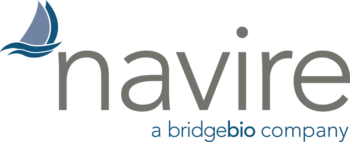Navire Pharma, a BridgeBio subsidiary, to Present Data Showing Potential of SHP2 Inhibitor IACS-13909 in Treatment-Resistant Lung Cancer
Preclinical data shows SHP2 inhibitor enhances activity of osimertinib in EGFR-driven tumor xenografts
San Francisco, CA – October 16, 2019 – Navire Pharma, Inc., a BridgeBio Pharma, Inc. subsidiary developing small molecule inhibitors of the protein tyrosine phosphatase SHP2 (Src homology 2 domain-containing phosphatase), today announced preclinical data demonstrating the potential for the Company’s SHP2 inhibitor to lung cancer tumor cells that have acquired resistance to EGFR inhibitors, which are common targeted cancer medicines. The data will be presented at AACR-NCI-EORTC International Conference on Molecular Targets and Cancer Therapeutics on October 29, 2019.
“Our work with MD Anderson’s Institute for Applied Cancer Science (IACS) adds to the growing body of evidence that SHP2 is an important node in MAPK signaling and supports combining a SHP2 inhibitor with an RTK inhibitor in RTK-driven cancers,” said Shafique Virani, CEO of Navire Pharma. “The aim of BridgeBio’s BBP-398 program is to rapidly translate this exciting science into the clinic to evaluate the program’s potential to manage treatment-resistant cancers. We are preparing the program to be ready for clinical testing in 2020.”
In a poster entitled “Discovery of IACS-13909, an allosteric SHP2 inhibitor that overcomes multiple mechanisms underlying osimertinib resistance,” Yuting Sun, Ph.D., a member of the Institute for Applied Cancer Science at MD Anderson Cancer Center, from which Navire licensed its SHP2 inhibitors, will present preclinical data demonstrating that the allosteric SHP2 inhibitors were able to reduce growth of EGFR-driven non-small cell lung cancer (NSCLC) in vitro and in vivo. Importantly, IACS-13909 enhanced the anti-tumor activity of osimertinib, a front-line therapy for EGFR mutated NSCLC, when used in combination with osimertinib in preclinical models.
SHP2, a conserved protein tyrosine phosphatase, is a critical node in growth factor, cytokine and integrin signaling, all of which are important in the progression of cancer. SHP2 regulates multiple downstream signaling pathways including RTK/MAPK and the adaptive immune response through checkpoint inhibition. Alterations in RTK/MAPK and checkpoint inhibition pathways are common in cancer. Thus, targeting SHP2 may offer a potential new approach to treat this disease.
About Navire Pharma
Navire Pharma, a subsidiary of BridgeBio Pharma, and in collaboration with the Institute for Applied Cancer Science at MD Anderson, is developing inhibitors of SHP2 as targeted therapeutics for the treatment of multiple cancers. Founded in 2017 with the aim of harnessing advances in understanding of SHP2 signaling to create novel targeted oncology medications, Navire is led by a team of veteran biotechnology executives. Together with patients and physicians, the company aims to bring safe, effective treatments to market as quickly as possible.
Forward-Looking Statements
This press release contains forward-looking statements. Statements we make in this press release may include statements which are not historical facts and are considered forward-looking within the meaning of Section 27A of the Securities Act of 1933, as amended (the “Securities Act”), and Section 21E of the Securities Exchange Act of 1934, as amended (the “Securities Exchange Act”), which are usually identified by the use of words such as “anticipates,” “believes,” “estimates,” “expects,” “intends,” “may,” “plans,” “projects,” “seeks,” “should,” “will,” and variations of such words or similar expressions. We intend these forward-looking statements to be covered by the safe harbor provisions for forward-looking statements contained in Section 27A of the Securities Act and Section 21E of the Securities Exchange Act and are making this statement for purposes of complying with those safe harbor provisions. These forward-looking statements, including statements relating to the clinical and therapeutic benefits of Navire’s BBP-398 program, Navire’s clinical development plans, including its plans to file an investigational new drug application and initial clinical testing of BBP-398, and the timing of these events, reflect our current views about our plans, intentions, expectations, strategies and prospects, which are based on the information currently available to us and on assumptions we have made. Although we believe that our plans, intentions, expectations, strategies and prospects as reflected in or suggested by those forward-looking statements are reasonable, we can give no assurance that the plans, intentions, expectations or strategies will be attained or achieved. Furthermore, actual results may differ materially from those described in the forward-looking statements and will be affected by a variety of risks and factors that are beyond our control including, without limitation, Navire’s ability to continue its planned development and regulatory submissions for BBP-398, and the timing and success of any such clinical development and planned regulatory submissions, as well as those set forth in the Risk Factors section of BridgeBio Pharma, Inc.’s most recent Quarterly Report on Form 10-Q and BridgeBio’s other SEC filings. Except as required by law, we assume no obligation to update publicly any forward-looking statements, whether as a result of new information, future events or otherwise.
